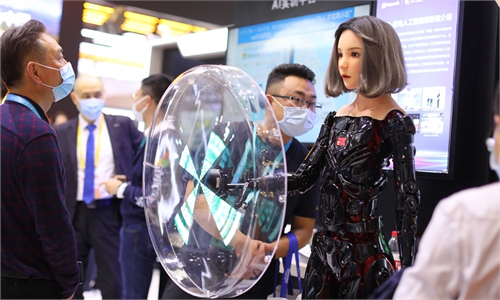
China US photo:GT
US Trade Representative Katherine Tai said on Friday that traditional trade tools and the multilateral trading system had failed to address China's so-called "non-transparent, state-directed industrial dominance policies."
Heightened economic insecurity and other factors "have pushed us to re-examine our approach to trade," Tai said, adding that "the need for correction is clear, and industrial policy is a part of that re-balancing effort."
These days, it is no surprise to see US politicians relentlessly promoting the decoupling theory, but it is a little surprising to hear such dramatic and unprofessional remarks from the US' trade chief.
As Trade Representative, Tai acts as the principal trade adviser, negotiator, and spokesperson for the US President on trade and related investment matters. The trade relationship between China and the US is arguably the most important and complicated in the world. However, Tai's understanding of China is simplistic, arbitrary and formed on distorted facts.
From former US president Donald Trump's trade war with China to Washington's ongoing crackdown on China's technology sector, trade ties between the US and China have remained delicate in recent years. The US-China Business Council (USCBC), which represents major American companies doing business in China, said a study by Oxford Economics estimates a significant decoupling of the world's two largest economies could result in 732,000 fewer US jobs in 2022 and 320,000 fewer jobs by 2025, according to Reuters. But Tai, despite serving as the US trade chief, does not seem worried about the economic losses caused by toxic trade policies.
Tai on Friday said that the global impact of China's economic policies have profoundly limited the ability of workers and industries in open markets and "free societies" to thrive or even survive. "This has led many people to view trade and globalization with increased hostility - and to a lack of confidence in our very institutions," she said.
Tai appears to be trying to create the illusion that China's integration with the global economic system has a negative impact on globalization. The Biden administration has maintained a hawkish stance toward China and deflected criticism by blaming China for economic difficulties in the US, some of which are the results of its policies. Their real purpose is to exclude China from the global industrial chain and strengthen US supply chains with new "industrial policies."
Some US politicians are still promoting China-US decoupling despite the fact that the move goes against market principles and causes losses for the US itself. Will the world really benefit from decoupling from China? Clearly, the answer to that question is no.
Ultimately, whatever Tai says or does cannot erase the fact that China has always been a firm supporter and active advocate of economic globalization and regional economic integration. China has become a top trading partner of over 120 countries and regions, including the US, the EU, as well as Japan. Given China's market scale, economic resilience and pivotal position in the global supply chains, decoupling from China will be completely empty talk.
The author is a reporter with the Global Times. bizopinion@globaltimes.com.cn

